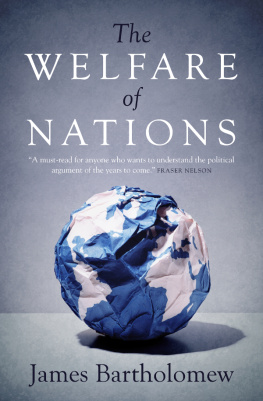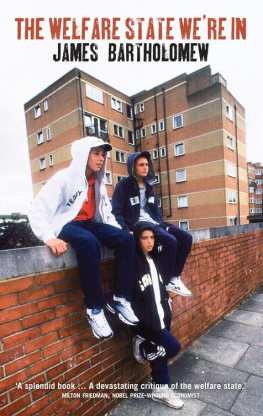The
WELFARE
of
NATIONS
Copyright @ 2016 by James Bartholomew.
All rights reserved.
This edition of The Welfare of Nations is published by arrangement with Biteback Publishing. Originally published in Great Britain by Biteback Publishing Ltd.
James Bartholomew 2015.
ISBN: 978-1-939709-91-2
eBook ISBN: 978-1-939709-92-9
Library of Congress Cataloging-in-Publication Data available.
Printed in the United States of America.
CATO INSTITUTE
1000 Massachusetts Ave., N.W.
Washington, D.C. 20001
www.cato.org
Dedication
To the people who really went out of their way to help me with the research for this book: Jeremy Hosking played the key role of giving me some funding. Meir Kohn, economics professor at Dartmouth College, regularly sent me links to articles that could be of use, provided contacts, andjust as importantgave me encouragement. Christian Wignall chauffeured me from one appointment to another in San Francisco and Oakland, patiently waiting for me to emerge after each one. He also helped with contacts and kindly did restlessly intelligent research for me on various subjects. J. P. Floru of the Adam Smith Institute and Philip Booth of the Institute of Economic Affairs both repeatedly suggested and introduced me to contacts around the world. As well as granting me a couple of interviews, Leszek Balcerowicz, former deputy prime minister of Poland, opened doors for me in Warsaw that otherwise would have remained shut. Eva Cooper helped me with contacts in various parts of the world and answered questions about Sweden. Pedro Schwartz arranged interviews for me in Spain. Janadas Devan, director of the Institute of Policy Studies in Singapore, set up several days worth of meetings. To my surprise, I found one of them was with the deputy prime minister. Lindsay Mitchell, in New Zealand, organized an extraordinary day for me in and around Wellington, meeting one interesting person after another; and Greg Lindsay, founder and executive director of the Centre for Independent Studies in Sydney, set up a program of meetings for me, gave me a bed for the night, and made the supreme sacrifice of letting me play bad golf at his club.
Contents
Preface:
No! No! No! How Lady Thatcher Helped Prompt the Writing of This Book
1. Why Are So Many Swedish People Disabled?
The World of Welfare from Opheltas to Bismarck to the Clever Research of Kathryn Edin
2. Heart of the Darkness
Welfare States and Unemployment
3. In Search of the Best Health Care System in the World
Rather Like Looking for the Lost Ark of the Covenant
4. Daisy, Cross Your Fingers
The Scandal of State Education
5. Do I Have Stupid Tattooed on My Forehead?
Social HousingApple Pie with Poison in the Filling
6. In Our Liberal Society, There Is a Group of Staunchly Conservative PeopleChildren
Inconvenient Truths about Parenting
7. People Used to Be Grateful and Eager. Now the Attitude Is, I Want This. You Get It for Me.
The Effect of Welfare States on Behavior
8. Not to Be Read by Anyone under the Age of 40
Pensions and Their Unexpected Consequences
9. While Her Dear Father Lived, Any Change of Condition Must Be Impossible for Her. She Would Never Quit Him
Who Cares for the Elderly?
10. All Animals Are Equal, But Some Animals Are More Equal Than Others
The Public Sector
11. Its Like Putting All Bus Drivers through Astronauts Training
The Training and Qualifications Bonanza
12. Democracy Is Like a Drunk Husband
The Trouble with Representative Democracies
13. And the Winner Is... Welfare Statism!
Summary
Appendix 3. Groundhog DayBut Not Everywhere
Themes and Contrasts
Afterword
Inequality: Do Bigger Welfare States Create More Equal, Happier People?
How much do you know about the way the world works? Is Sweden really socialist to the core? Which country is the single-parenting capital of the world? Is America a free-market, capitalist nation with barely any social provision? How does Britain fare in treating breast cancer compared with other countries that do not have a national health service? Which country has the lowest unemployment?
Take the quiz. Write down your answers and see how you score:
1. What is the average rate of functional illiteracy in the advanced world?
(a) 2 percent
(b) 5 percent
(c) 11 percent
(d) 18 percent
2. Which of these countries has the highest proportion of people living alone?
(a) United States
(b) Italy
(c) Australia
(d) Sweden
3. In early 2014, one of these countries had an unemployment rate of 25.6 percent and another only 2.8 percent. Which was which?
(a) Spain
(b) Singapore
(c) France
(d) Poland
(e) Japan
(f) Switzerland
4. Which of these countries has the worst five-year survival rate for breast cancer?
(a) United States
(b) United Kingdom
(c) Netherlands
(d) Australia
5. What is the percentage of elderly living in residential care in England and Wales that say that they wish that they were dead?
(a) 3 percent
(b) 8 percent
(c) 12 percent
(d) 21 percent
6. At what age are Polish soldiers and policemen eligible to retire on a pension?
(a) 35
(b) 45
(c) 55
(d) 65
7. Who said, He who does not work shall not eat (and that only those who work should be allowed access to consumer goods)?
(a) Adam Smith
(b) Milton Friedman
(c) Margaret Thatcher
(d) Vladimir Lenin
8. What is or was the rubber room?
(a) A windowless room with rubber walls for uncontrollable students in a Bronx school
(b) A room in a French mairie to which records revealing the corruption of officials are taken to be destroyed
(c) A place in New York where teachers went during the long-winded process of firing them
(d) A rest and recreation room for union officials in Spanish companies
9. What was the rate of youth unemployment in Spain in early 2014?
(a) 17 percent
(b) 23 percent
(c) 34 percent
(d) 54 percent
10. How many people in the United States received food stamps in 2013?
(a) 3 million
(b) 12 million
(c) 21 million
(d) 48 million
11. Which country has the highest proportion of free or charter schools?
(a) Australia
(b) Sweden
(c) United Kingdom
(d) United States
12. Which country has the lowest unemployment rate?
(a) Switzerland
(b) Sweden
(c) Singapore
(d) United States
13. Between 1987 and 2001, the proportion of social (public) housing in Germany changed. In which way?
(a) It more than doubled.
(b) It increased by over a half.
(c) It increased by a quarter.
(d) It more than halved.
14. Which country has the highest rate of criminal assaults and threats?
(a) Australia
(b) England and Wales
(c) United States
(d) Sweden
15. Which country has the highest number of angioplasty, hip replacement, and knee replacement operations per 100,000?
(a) France
(b) United States
(c) Germany
(d) Sweden
16. Who said, I propose to create a Civilian Conservation Corps to be used in simple work; more important, however, than the material gains will be the moral and spiritual value of such work?











